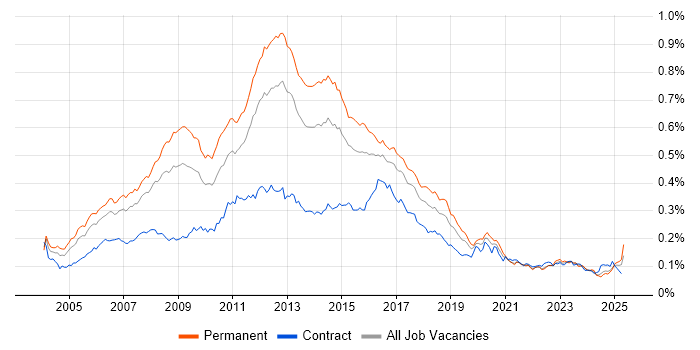Linux Administrator
UK
The median Linux Administrator salary in the UK is £68,750 per year, according to job vacancies posted during the 6 months leading to 11 June 2025.
The table below provides salary benchmarking and summary statistics, comparing them to the same period in the previous two years.
| 6 months to 11 Jun 2025 |
Same period 2024 | Same period 2023 | |
|---|---|---|---|
| Rank | 658 | 842 | 820 |
| Rank change year-on-year | +184 | -22 | +324 |
| Permanent jobs requiring a Linux Administrator | 62 | 80 | 121 |
| As % of all permanent jobs advertised in the UK | 0.11% | 0.073% | 0.13% |
| As % of the Job Titles category | 0.12% | 0.077% | 0.14% |
| Number of salaries quoted | 46 | 76 | 91 |
| 10th Percentile | £46,250 | £41,500 | £40,500 |
| 25th Percentile | £52,500 | £46,250 | £47,500 |
| Median annual salary (50th Percentile) | £68,750 | £50,000 | £57,500 |
| Median % change year-on-year | +37.50% | -13.04% | +27.78% |
| 75th Percentile | £80,000 | £58,750 | £73,750 |
| 90th Percentile | £81,250 | £65,000 | £185,000 |
| UK excluding London median annual salary | £60,000 | £50,000 | £50,000 |
| % change year-on-year | +20.00% | - | +25.00% |
All Permanent IT Job Vacancies
UK
For comparison with the information above, the following table provides summary statistics for all permanent IT job vacancies. Most job vacancies include a discernible job title that can be normalized. As such, the figures in the second row provide an indication of the number of permanent jobs in our overall sample.
| Permanent vacancies in the UK with a recognized job title | 50,444 | 103,306 | 84,719 |
| % of permanent jobs with a recognized job title | 90.11% | 94.76% | 91.22% |
| Number of salaries quoted | 26,548 | 73,046 | 55,145 |
| 10th Percentile | £28,000 | £28,500 | £32,500 |
| 25th Percentile | £40,000 | £38,572 | £45,000 |
| Median annual salary (50th Percentile) | £55,000 | £52,500 | £60,000 |
| Median % change year-on-year | +4.76% | -12.50% | - |
| 75th Percentile | £73,750 | £70,000 | £80,000 |
| 90th Percentile | £95,000 | £90,000 | £100,000 |
| UK excluding London median annual salary | £50,055 | £50,000 | £53,500 |
| % change year-on-year | +0.11% | -6.54% | +6.37% |
Linux Administrator
Job Vacancy Trend
Job postings that featured Linux Administrator in the job title as a proportion of all IT jobs advertised.

Linux Administrator
Salary Trend
3-month moving average salary quoted in jobs citing Linux Administrator.
Linux Administrator
Salary Histogram
Salary distribution for jobs citing Linux Administrator over the 6 months to 11 June 2025.
Linux Administrator
Top 11 Job Locations
The table below looks at the demand and provides a guide to the median salaries quoted in IT jobs citing Linux Administrator within the UK over the 6 months to 11 June 2025. The 'Rank Change' column provides an indication of the change in demand within each location based on the same 6 month period last year.
| Location | Rank Change on Same Period Last Year |
Matching Permanent IT Job Ads |
Median Salary Past 6 Months |
Median Salary % Change on Same Period Last Year |
Live Jobs |
|---|---|---|---|---|---|
| England | +154 | 57 | £70,000 | +33.33% | 50 |
| UK excluding London | +168 | 38 | £60,000 | +20.00% | 36 |
| Work from Home | +125 | 23 | £75,000 | +42.86% | 26 |
| London | +119 | 23 | £77,500 | +24.00% | 20 |
| South East | +86 | 16 | £70,000 | +27.27% | 13 |
| South West | +101 | 8 | £55,000 | +15.79% | 10 |
| East of England | +38 | 6 | £73,750 | +47.50% | 1 |
| North of England | +62 | 4 | £55,000 | -15.38% | 6 |
| Wales | +41 | 4 | £47,500 | -5.00% | 3 |
| Yorkshire | - | 3 | - | - | 5 |
| North West | +19 | 1 | £55,000 | -15.38% | 1 |
Linux Administrator Skill Set
Top 30 Co-occurring Skills and Capabilities
For the 6 months to 11 June 2025, Linux Administrator job roles required the following skills and capabilities in order of popularity. The figures indicate the absolute number co-occurrences and as a proportion of all permanent job ads featuring Linux Administrator in the job title.
|
|
Linux Administrator Skill Set
Co-occurring Skills and Capabilities by Category
The follow tables expand on the table above by listing co-occurrences grouped by category. The same employment type, locality and period is covered with up to 20 co-occurrences shown in each of the following categories:
|
|
|||||||||||||||||||||||||||||||||||||||||||||||||||||||||||||||||||||||||||||||||||||||||||||||||||
|
|
|||||||||||||||||||||||||||||||||||||||||||||||||||||||||||||||||||||||||||||||||||||||||||||||||||
|
|
|||||||||||||||||||||||||||||||||||||||||||||||||||||||||||||||||||||||||||||||||||||||||||||||||||
|
|
|||||||||||||||||||||||||||||||||||||||||||||||||||||||||||||||||||||||||||||||||||||||||||||||||||
|
|
|||||||||||||||||||||||||||||||||||||||||||||||||||||||||||||||||||||||||||||||||||||||||||||||||||
|
|
|||||||||||||||||||||||||||||||||||||||||||||||||||||||||||||||||||||||||||||||||||||||||||||||||||
|
|
|||||||||||||||||||||||||||||||||||||||||||||||||||||||||||||||||||||||||||||||||||||||||||||||||||
|
|
|||||||||||||||||||||||||||||||||||||||||||||||||||||||||||||||||||||||||||||||||||||||||||||||||||
|
||||||||||||||||||||||||||||||||||||||||||||||||||||||||||||||||||||||||||||||||||||||||||||||||||||
